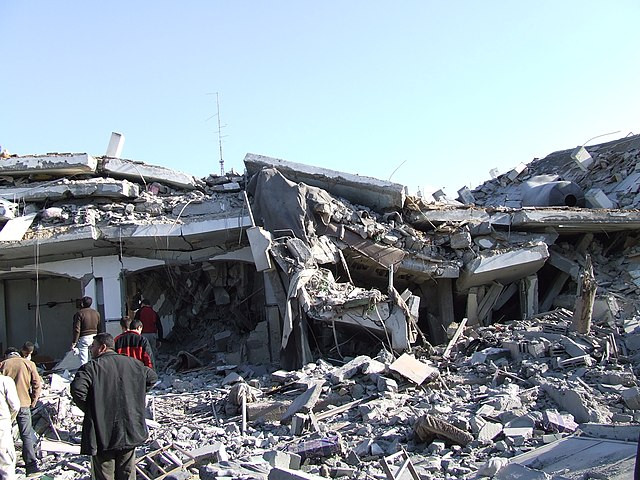In a stark illustration of the ongoing crisis in Gaza, Israeli airstrikes continue to wreak havoc even in areas designated as "safe zones" by the Israeli military. On Wednesday, an airstrike targeted a residential building adjacent to the main medical center in Khan Younis, killing at least seven people, according to hospital authorities and eyewitnesses.
The strike near Nasser Hospital sent plumes of dust billowing through the streets, causing panic among residents. As chaos ensued, with people running in all directions, civil defense first responders and bystanders sifted through the debris in search of survivors. The scene was a grim reminder of the persistent danger faced by civilians in Gaza, despite supposed safe zones.
Nasser Hospital, located in the western part of Khan Younis, lies within an area previously designated as a humanitarian safe zone by Israel. However, this has not spared it from repeated attacks. The Israeli military's recent evacuation order for Khan Younis has displaced approximately 250,000 people, according to United Nations estimates. Many of these displaced families have struggled to find refuge in overcrowded shelters and open spaces in the western part of the city.
"We were sitting in this tent, three people, and we were surprised by the rubble and dust," said Jalal Lafi, a resident displaced from Rafah. "The house was bombed without any warning, hit by two missiles in a row, one after another," he added, his hair and clothes covered in grey soot as he surveyed the destruction.
The situation in Gaza has been described as dire by international observers. Andrea De Domenico, head of the UN Office for the Coordination of Humanitarian Affairs (OCHA) in the occupied Palestinian territories, stated, "Gaza is the only place in the world where people cannot find a safe refuge, and can't leave the front line." Even in designated safe areas, bombings persist, leaving civilians with nowhere to turn.
Tuesday saw another tragic incident when an Israeli airstrike killed a prominent Palestinian doctor and eight members of his extended family. The family had complied with military orders to evacuate their home and had moved to a designated safe zone just hours before the attack.
The humanitarian situation in Gaza is exacerbated by the limited access to essential supplies. The amount of food and other necessities entering Gaza has significantly decreased since Israel's offensive into Rafah began two months ago, leading to widespread hunger and fears of famine. "It's an unendurable life," said Anwar Salman, another displaced Palestinian. "If they want to kill us, let them do it. Let them drop a nuclear bomb and finish us. We are fed up. We are tired. We are dying every day."
Efforts to deliver aid to the affected areas have faced numerous obstacles. The UN has managed to meet basic needs in northern Gaza but struggles to get aid into the southern regions. Israel claims it allows aid to enter via the Kerem Shalom crossing, but the UN and other humanitarian groups point to ongoing fighting, Israeli military restrictions, and chaos on the ground, including incidents of criminal gangs intercepting aid.
The conditions in the so-called safe zones are deplorable. Much of the area is now covered with makeshift tent camps that lack sanitation and medical facilities. Families live amidst heaps of trash and contaminated water, highlighting the severe humanitarian crisis.
As the conflict continues, the international community remains divided on how to address the crisis. The European Hospital in Khan Younis has been rendered non-operational due to bombings, and Gaza's Ministry of Health reports that only 15 of 36 hospitals are partially functional. De Domenico noted that nine out of every ten people in Gaza have been displaced at least once, with many experiencing multiple displacements.
The Israeli military has not commented on the latest airstrikes, but the ongoing conflict raises serious questions about the viability of designated safe zones and the protection of civilians in conflict zones. With the humanitarian situation deteriorating, the need for a sustainable resolution to the conflict is more urgent than ever.




